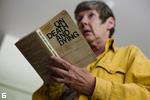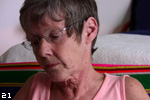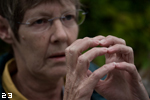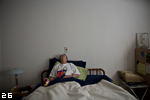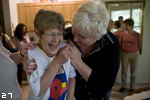End-of-Life Resources
![]()
HOSPICE
Oregon is a national leader in providing hospice, or “comfort care,” for patients at the end of their lives.
The goal of hospice care is not to prolong life, but to keep a dying person’s pain and symptoms under control so the patient can live as fully and comfortably as possible to the end. Most hospice patients in Oregon die at home.
In all, 72 hospice programs serve Oregonians. Hospice care is available in every county.
The Oregon Hospice Association offers information and help on end-of-life choices, planning and care. It can refer patients and families to the hospice in their area.
For information, call 503-228-2104. Toll-free: 888-229-2104.
Web site: www.oregonhospice.org.
![]()
POLST
Anyone facing a life-threatening illness should fill out a POLST (Physician Orders for Life-Sustaining Treatment) form to specify what kind of life-sustaining treatment they want or do not want if they collapse and are not fully responsive when found. The form, available at any doctor’s office, helps emergency physicians, ambulance personnel and trauma workers honor the end-of-life desires of their patients. For more information, call 503-494-3965.
Web site: www.polst.org.
![]()
BOOKS
“The Year of Magical Thinking” by Joan Didion (Vintage, $13.95, 240 pages)
An account of the year following the death of the author’s husband, John Gregory Dunne, this book won the National Book Award in 2005 and was a finalist for the 2006 Pulitzer Prize.
“Last Rights: Rescuing the End of Life from the Medical System” by Stephen P. Kiernan (St. Martin’s Press, $25.95, 320 pages)
A critical analysis of end-of-life care in the United States; Lovelle’s favorite book on the subject.
“Handbook for Mortals: Guidance for People Facing Serious Illness” by Joanne Lynn and Joan Harrold (Oxford University Press, $17.95, 256 pages)
A practical guide by two doctors with deep experience in treating patients at the end of life.
“How We Die: Reflections on Life’s Final Chapter” by Sherwin B. Nuland (Vintage, $14.95, 304 pages)
A doctor’s attempt to demythologize dying, told through stories of his patients and family members.
“Death Without Denial, Grief Without Apology: A Guide for Facing Death and Loss” by Barbara Roberts (NewSage Press, $12, 132 pages)
An account by the former Oregon governor of the final year of life of her husband, Frank, who died of lung cancer.
“The Good Death: The New American Search to Reshape the End of Life” by Marilyn Webb (Bantam, $27, 512 pages)
Overview by a journalist and former chief editor of Psychology Today magazine.
“Approaching Death: Improving Care at the End of Life,” edited by Marilyn J. Field and Christine K. Cassel (National Academy Press, 437 pages; currently out of print, it’s available used on Amazon and in full online)
Findings of a national expert panel convened by the Institute of Medicine, chaired by Cassel, former dean of Oregon Health & Science University.
![]()
LECTURE
Providence Center for Health Care Ethics and Lewis & Clark Law School are offering a lecture that explores end-of-life issues.
Specifically, when does treatment at the end of life, or in conditions with devastating loss of functions, become “futile?” Does the determination of futility of treatment justify terminating life-sustaining treatment over the persistent objection of the patient or family?
Visiting scholar Sandra Johnson, J.D., L.L.M., will discuss these conflicts, which arise with some frequency and can persist despite the best efforts to resolve them.
The free lecture will be from 7 to 8 p.m., Tuesday, Oct. 16, in the student lounge at Lewis & Clark Law School, 10015 SW Terwilliger Blvd. in Portland.
For more information, go to providence.org/ethics
![]()
DEATH WITH DIGNITY ACT - PAST STORIES
Oregon voters first approved the Death with Dignity Act in 1994 and the newspaper has extensively reported on the issue since then. Read highlights of recent coverage below…
Death as unpredictable as life 5/27/2002
Dying patients refusing food 7/24/2003
Portland plaintiff wants to keep death options open 2/23/2005
‘Why am I not dead?’ 3/4/2005
Death on her terms 7/17/2005
Death act’s alias has state tongue-tied 11/11/2006
46 died via Dignity Act in ‘06 3/9/2007






